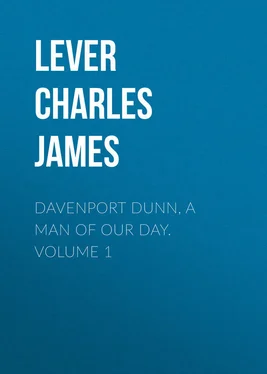Charles Lever - Davenport Dunn, a Man of Our Day. Volume 1
Здесь есть возможность читать онлайн «Charles Lever - Davenport Dunn, a Man of Our Day. Volume 1» — ознакомительный отрывок электронной книги совершенно бесплатно, а после прочтения отрывка купить полную версию. В некоторых случаях можно слушать аудио, скачать через торрент в формате fb2 и присутствует краткое содержание. Жанр: literature_19, foreign_antique, foreign_prose, на английском языке. Описание произведения, (предисловие) а так же отзывы посетителей доступны на портале библиотеки ЛибКат.
- Название:Davenport Dunn, a Man of Our Day. Volume 1
- Автор:
- Жанр:
- Год:неизвестен
- ISBN:нет данных
- Рейтинг книги:3 / 5. Голосов: 1
-
Избранное:Добавить в избранное
- Отзывы:
-
Ваша оценка:
- 60
- 1
- 2
- 3
- 4
- 5
Davenport Dunn, a Man of Our Day. Volume 1: краткое содержание, описание и аннотация
Предлагаем к чтению аннотацию, описание, краткое содержание или предисловие (зависит от того, что написал сам автор книги «Davenport Dunn, a Man of Our Day. Volume 1»). Если вы не нашли необходимую информацию о книге — напишите в комментариях, мы постараемся отыскать её.
Davenport Dunn, a Man of Our Day. Volume 1 — читать онлайн ознакомительный отрывок
Ниже представлен текст книги, разбитый по страницам. Система сохранения места последней прочитанной страницы, позволяет с удобством читать онлайн бесплатно книгу «Davenport Dunn, a Man of Our Day. Volume 1», без необходимости каждый раз заново искать на чём Вы остановились. Поставьте закладку, и сможете в любой момент перейти на страницу, на которой закончили чтение.
Интервал:
Закладка:
And Twining almost hugged himself in the ecstasy which his last words suggested.
“ Mine ,” said Lord Lackington, haughtily, “are of consequence enough to fetch him hither – a good thousand miles away from England; but he is pretty certain of its being well worth his while, to come.”
“Quite convinced of that – could swear it,” said Twining, eagerly.
“Here are a mob of insufferable bores,” said his Lordship, testily, as a number of people were heard approaching, for somehow – it is not easy to say exactly why – he had got into a train of thought that scorned to worry him, and was not disposed to meet strangers; and so, with a brief gesture of good-by to Twining, he turned into a path and disappeared.
Twining looked after him for a second or two, and then slapping his legs, he muttered, pleasantly, “What fun!” and took the road towards the house.
CHAPTER II. HOW TWO “FINE LADIES” PASS THE MORNING
In a room of moderate size, whose furniture was partly composed of bygone finery and some articles of modern comfort – a kind of compromise between a Royal residence and a Hydropathic establishment – sat two ladies at an open window, which looked out upon a small terrace above the lake. The view before them could scarcely have been surpassed in Europe. Enclosed, as in a frame, between the snow-clad Alps and the wooded mountains of the Brianca, lay the lake, its shores one succession of beautiful villas, whose gardens descended to the very water. Although the sun was high, the great mountains threw the shadows half way across the lake; and in the dim depth of shade, tower and crag, battlement and precipice, were strangely intermixed, giving to the picture a mysterious grandeur that contrasted strongly with the bright reality of the opposite shore, where fruit and flowers, gay tapestries from casements, and floating banners, added colour to the scene.
Large white-sailed boats stole peacefully along, loaded, half-mast high, with water-melons and garden stores; the golden produce glittering in the sun, and glowing in the scarcely rippled water beneath them, while the low chant of the boatmen floated softly and lazily through the air – meet sounds in a scene where all seemed steeped in a voluptuous repose.
The two ladies whom we have mentioned were not impassioned spectators of the scene. Whenever their eyes ranged over it, no new brilliancy awoke in them, no higher colour tinged their cheek. One was somewhat advanced in life, but with many traces of beauty, and an air which denoted a lifelong habit of homage and deference.
There was that in her easy, lounging attitude, and the splendour of her dress, which seemed to intimate that Lady Lackington would still be graceful, and even extravagant, though there were none to admire the grace or be dazzled by the costliness. Her companion, though several years younger, looked, from the effects of delicate health and a suffering disposition, almost of her own age. She, too, was handsome; but it was a beauty which so much depended on tint and colour, that her days of indisposition left her almost bereft of good looks. All about her, her low, soft voice, her heavily raised eyelids, her fair and blue-veined hands, the very carriage of her head, pensively thrown forwards, were so many protestations of one who asked for sympathy and compassion; and who, whether with reason or without, firmly believed herself the most unhappy creature in existence.
If there was no great similarity of disposition to unite them, there was a bond fully as strong. They were both English of the same order, both born and bred up in a ritual that dictates its own notions of good or bad, of right and wrong, of well-bred and vulgar, of riches and poverty. Given any person in society, or any one event of their lives, and these two ladies’ opinion upon either would have been certain to harmonise and agree. The world for them had but one aspect; for the simple reason, that they had always seen it from the one same point of view. They had not often met; they had seen very little of each other for years; but the freemasonry of class supplied all the place of affection, and they were as fond and as confiding as though they were sisters.
“I must say,” said the Viscountess, in a tone full of reprobation, “that is shocking – actually shameful; and, in your place, I’d not endure it!”
“I have become so habituated to sorrow,” sighed Lady Grace
“That you will sink under it at last, my dear, if this man’s cruelties be not put an end to. You really must allow me to speak to Lackington.”
“It wouldn’t be of the slightest service, I assure you. In the first place, he is so plausible, he’d persuade any one that there was nothing to complain of, that he lived up to his fortune, that his means were actually crippled; and secondly, he’d give such pledges for the future, such promises, that it would be downright rudeness to throw a doubt on their sincerity.”
“Why did you marry him, my dear?” said Lady Lackington, with a little sigh.
“I married him to vex Ridout; we had a quarrel at that fête at Chiswick, you remember, Tollertin’s fête . Ridout was poor, and felt his poverty. I don’t believe I treated his scruples quite fairly. I know I owned to him that I had no contempt for riches – that I thought Belgrave-square, and the Opera, and Diamonds, and a smart Equipage, all very commendable things: and Jack said, ‘Then, there’s your man. Twining has twenty thousand a year.’ ‘But, he has not asked me,’ said I, laughing. Ridout turned away without a word. Half an hour later, Mr. Adderley Twining formally proposed for my hand, and was accepted.”
“And Jack Ridout is now the Marquis of Allerton,” said Lady Lackington.
“I know it!” said the other, bitterly.
“With nigh forty thousand a year.”
“I know it!” cried she, again.
“And the handsomest house and the finest park in England.”
The other burst into tears, and hid her face between her hands.
“There’s a fate in these things, my dear,” said Lady Lackington, with a slight paleness creeping over her cheek. “That’s all we can say about them.”
“What have you done with that sweet place in Hampshire?”
“Dingley? It is let to Lord Mauley.”
“And you had a house in St. James’s-square.”
“It is Burridge’s Hotel, now.”
Lady Lackington fanned her swarthy face for some seconds, and then said, “And how did you come here?”
“We saw – that is, Twining saw – an advertisement of this new establishment in the Galignani . We had just arrived at Liége, when he discovered a vetturino returning to Milan with an empty carriage; he accordingly bargained with him to take us on here – I forget for what sum – so that we left our own carriage, and half my luggage, at the Pavilion Hotel, and set off on our three weeks’ journey. We have been three weeks all but two days on the road! My maid of course refused to travel in this fashion, and went back to Paris. Courcel, his own man, rebelled too, which Twining, I must say, seemed overjoyed at, and gave him such a character for honesty in consequence, as he never could have hoped for; and so we came on, with George the footman, and a Belgian creature I picked up at the hotel, who, except to tear out my hair when she brushes it, and bruise me whenever she hooks a dress, has really no other gift under heaven.”
“And you actually came all this way by vetturino?”
Lady Grace nodded a sad assent, and sighed deeply.
“What does he mean by it, my dear? The man must have some deep, insidious design in all this; – don’t you think so?”
“I think to myself, sometimes,” replied she, sorrowfully. And now their eyes met, and they remained looking steadily at each other for some seconds. Whatever Lady Grace’s secret thoughts, or whatever the dark piercing orbs of her companion served to intimate, true is it that she blushed till her cheek became crimson; and as she arose, and walked out upon the terrace, her neck was a-flame with the emotion.
Читать дальшеИнтервал:
Закладка:
Похожие книги на «Davenport Dunn, a Man of Our Day. Volume 1»
Представляем Вашему вниманию похожие книги на «Davenport Dunn, a Man of Our Day. Volume 1» списком для выбора. Мы отобрали схожую по названию и смыслу литературу в надежде предоставить читателям больше вариантов отыскать новые, интересные, ещё непрочитанные произведения.
Обсуждение, отзывы о книге «Davenport Dunn, a Man of Our Day. Volume 1» и просто собственные мнения читателей. Оставьте ваши комментарии, напишите, что Вы думаете о произведении, его смысле или главных героях. Укажите что конкретно понравилось, а что нет, и почему Вы так считаете.












